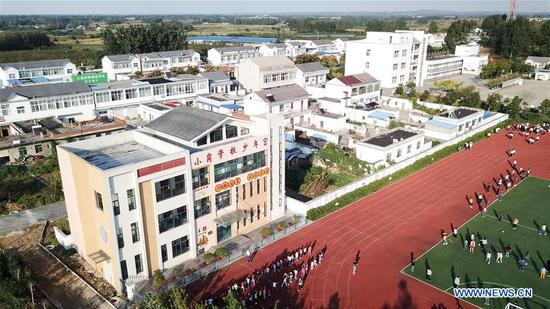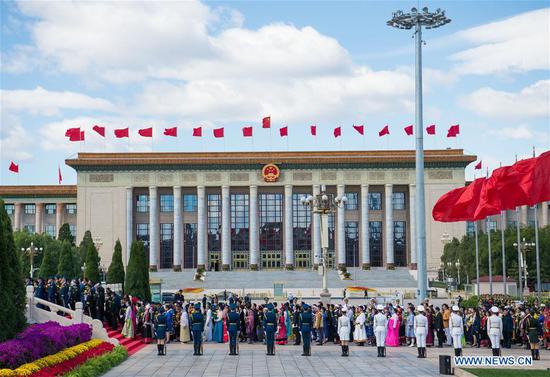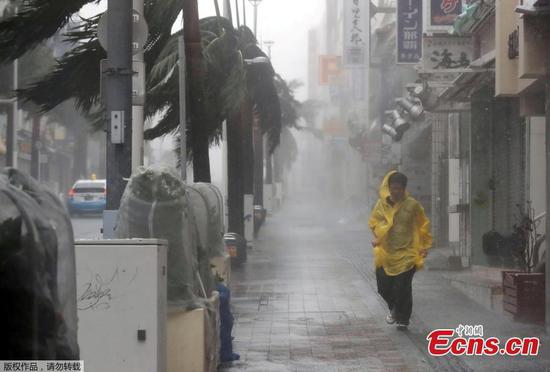
A recent graduate, who has newly arrived in Beijing, checks an online rental site for a living space. (Photo by CHEN TONG / FOR China Daily)
About 270 million people will lease housing by 2030, analysts say.
Zhang Shuoqi, a 31-year-old website editor who rented an apartment in Beijing for two years, recently became an intercity commuter. She now gets up at 5 every morning to commute between Tianjin and Beijing by train.
In addition to a broken toilet and street noise late at night, the final straw that made her decide to move was that the rent on her 7-square-meter room would soon rise by 500 yuan ($73) to 3,350 yuan, more than 40 percent of her monthly salary.
“The rent is too expensive. I’d rather live in my own home in Tianjin, which is larger and more comfortable,” she said.
Cao Xiaofang, a saleswoman in Shenzhen, Guangdong province, was told she would have to pay an extra 1,000 yuan to continue living in the same apartment when her one-year rental contract expired in August.
Although she had a 10-sq-m bedroom, Cao shared the kitchen, living room and restroom with six people, and often had to wait in line to take a shower.
“Young people in Shenzhen are under pressure. Many of us live in small spaces like pigeon lofts,” she said.
Li Ran, a 28-year-old brand planner, who rented in Beijing, said the rent accounted for 25 percent of her salary. “The salary of many migrants in Beijing is just about enough to ensure they don’t starve,” she said.
Qian Junjie, a consultant in Shanghai, has just rented his house to several tea salesmen. He said he raised the rent by 2,000 yuan this year.
“If I know others are asking for 6,000 yuan, why should I keep it at 4,000 yuan? I’m in debt, too. But I don’t mind giving a discount, say, 5,800 yuan, to have a stable tenant,” he said.
About 190 million people in China are renters, and the figure is expected to reach 270 million by 2030, bolstering the scale of the rental market to 4.2 trillion yuan, according to data from Orient Securities.
The rising rents in major cities, such as Beijing, Shen-zhen and Shanghai, pose challenges for migrants, especially the younger generation, to survive, and recently sparked a nationwide discussion about the rental market.
According to Creprice, a website managed by the China Real Estate Association, the average per-square-meter rental in Beijing was 94.87 yuan in August, a year-on-year rise of about 21 percent. In Shanghai, the figure was 75.34 yuan, a 19 percent rise from last year, while the rate in Shenzhen was more than 25 percent.
Liu Weimin, a researcher with the Development Research Center of the State Council, China’s Cabinet, told Xinhua News Agency that part of the reason for the rising cost is that real estate agencies are eager to expand their scale as more capital flows into the rental market.
In January, Ziroom, a major online apartment rental platform, completed financing of up to 4 billion yuan. Danke, another real estate rental operator, received financing of $100 million this year.
Wen Ming, a former real estate agent and a subletter in Beijing for more than 10 years, said many of the companies raised rental costs to persuade homeowners to sign agreements with them.
“They thought if they acted for many clients, they could decide rental as they wanted,” he said. “It’s a regional monopoly.”
He added that the competition for homes is not just happening among companies, but also within companies. “Each store has a KPI (key performance indicator) system, decided by the number of houseowners they have signed.”
The rumor became public when Hu Jinghui, former vice-president of 5i5j, told the media that major rental service operators were competing to get homes by raising rental fees. He left the company soon after, and two companies he had mentioned refuted his comments.
In late August, 10 rental companies announced that they would not raise rental fees unnecessarily and promised to release more than 120,000 houses to provide a stable and healthy rental market, as organized by the Beijing real estate agents association.
Daniel Yao, head of research at JLL China, a provider of real estate services, said the recent surge in rental prices indicated strong demand for leasing homes, especially from young people.
More millennials have started to flow into the labor market, and they are more willing to rent rather than buy, given the high property price and tightened purchasing policy, he said.
To solve the problem, the supply of rental houses should be increased by making full use of the stock of real estate, he added.
Some hotels, shopping malls and office buildings that have performed poorly could be renovated into rental apartments, Yao said, adding that information provided should be more transparent for both landlords and tenants. For example, tenants with high individual credit could be given a discount in rental or other favorable terms.
Besides, the recent reform of personal income tax provides a certain deduction for people with children in need of education, and for expenses to pay for treatment of serious illnesses. Maybe the same rules could benefit tenants, too, he said.
Wang Jia, a partner at Roland Berger, said rents would rise in the long term due to the process of urbanization and economic development. But the rise will be stable under macroscopic readjustment and control from the government.
He said since the country has successfully regulated the real estate market — to avoid speculation and a housing price surge — the future of the rental market is positive.
“Efforts should be made to fight dishonest intermediary agents and speculation,” he said, adding that companies should innovate their products to improve services to customers.


















































